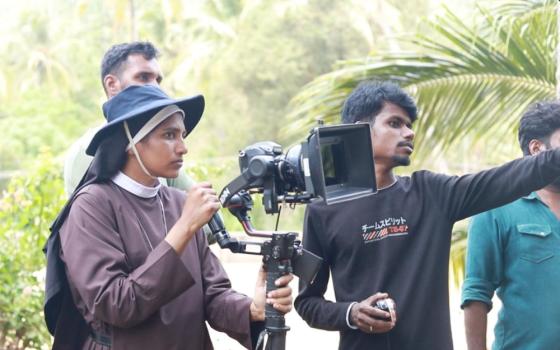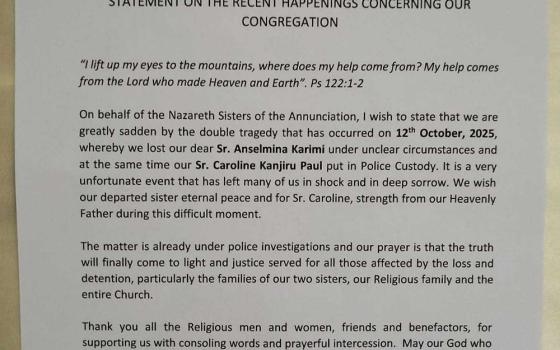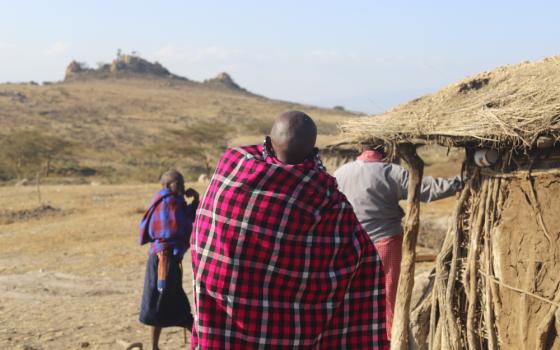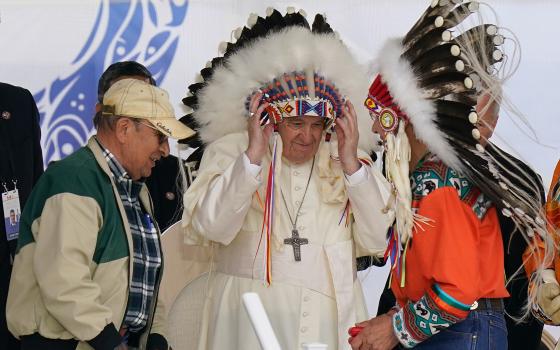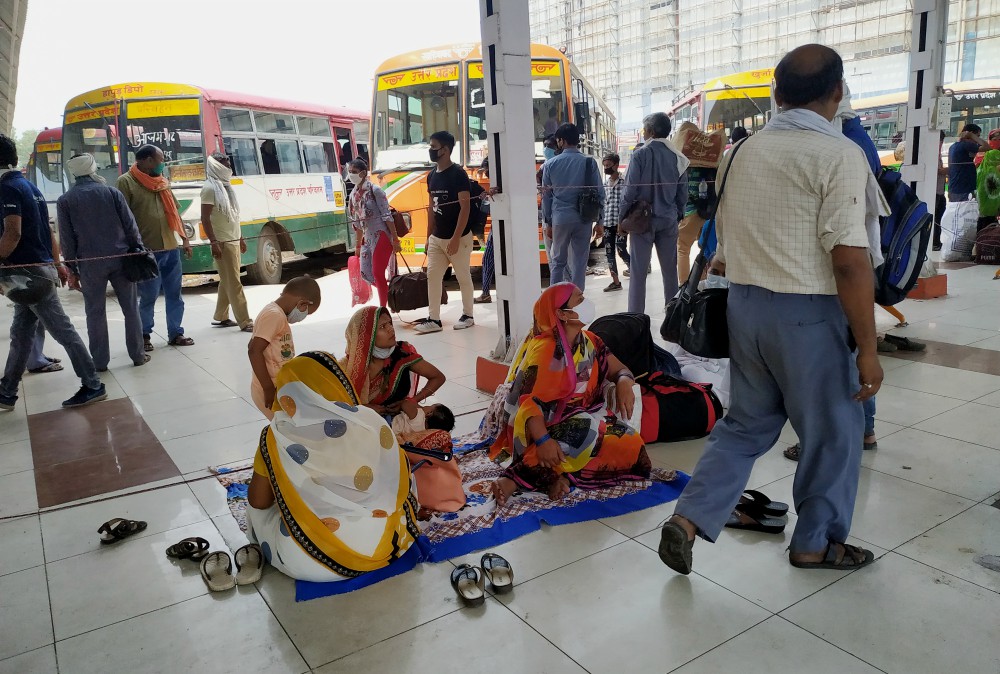
Mothers and children wait at Kaushambi Bus Terminal on the Delhi-Uttar Pradesh border to go to their villages in eastern India hundreds of kilometers away. (Jessy Joseph)
Sr. Sujata Jena could not sleep after seeing a picture of a young girl with a heavy load on her head in a WhatsApp message. "Her stained face, wet with tears, haunted me," the member of the Sacred Hearts of Jesus and Mary told Global Sisters Report.
The photo was being circulated to illustrate the plight of hundreds of thousands of people who hit India's highways following a nationwide lockdown to contain the coronavirus pandemic.
As Jena saw on social media platforms pictures and videos from around India, the 38-year-old lawyer and nun set out to help migrants reach home. One video clip showed 10 workers crammed into a room in Kerala, a southwestern Indian state. The men said their employer had locked them up and that they desperately needed help to reach their villages in Odisha, more than 1,000 miles northeast.
As the lockdown confined her to her convent in the Odisha capital of Bhubaneswar, Jena on May 17 joined a social media network that helps the stranded migrants.
By June 24, more than 300 migrants, including the 10, stranded in southern Indian states reached their native villages in states such as Bihar, Chhattisgarh, Odisha and West Bengal in eastern India, thanks to Jena's efforts.
Jena is among hundreds of Catholic nuns who are on the front lines as the church reaches out to migrant laborers affected by the initial 21-day lockdown Prime Minister Narendra Modi imposed on India's 1.3 billion people from midnight of March 25 with only four hours' notice.
The lockdown, considered the world's largest and toughest attempt to contain the pandemic, has been extended five times with varying degrees of relaxation until July 31.
Advertisement
The lockdown suddenly rendered jobless millions of migrant laborers in cities.
"As they lost the job, they had no place to stay, no income and no security," says Salesian Fr. Joe Mannath, national secretary of the Conference of Religious India, the association of men and women religious major superiors in the country.
As the lockdown halted India's public transport system, migrant laborers in cities swarmed highways and roads within a few days. Most walked and some cycled to their native villages, hundreds of miles away.
Mannath says the fear of starvation and contracting the coronavirus led to a "chaotic exodus" of workers from cities.
Church groups are among those trying to help these workers.
On June 6, Caritas India, the Indian bishops' aid agency, informed a webinar that the church reached more than 11 million people during the lockdown period, including many migrant workers.
Mannath, who coordinates India's more than 130,000 religious, including nearly 100,000 women, claims the bulk of that service was carried out by the religious.
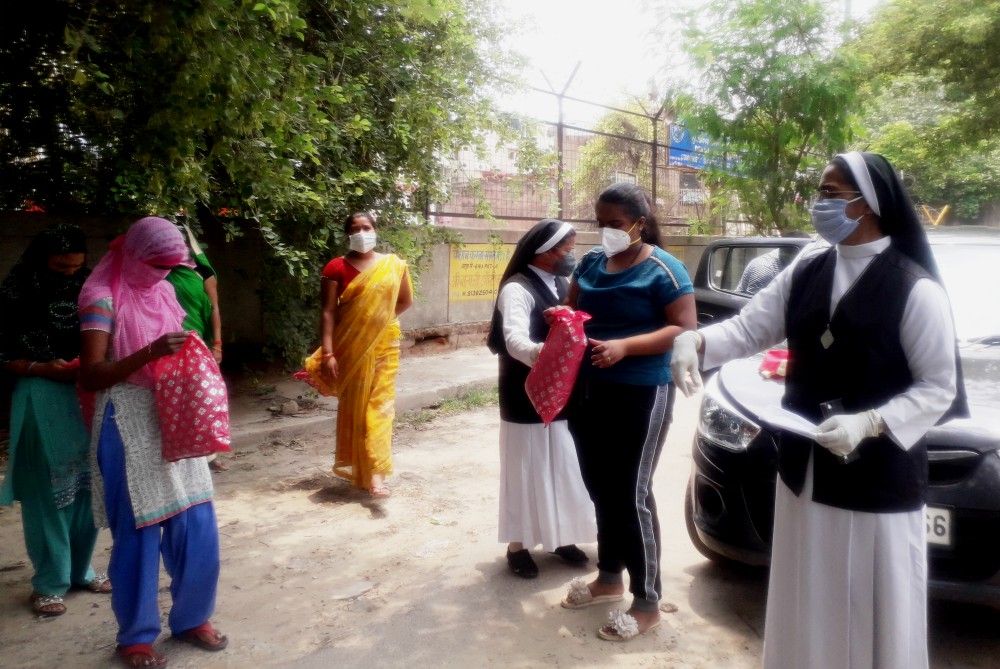
Sacred Heart Sr. Celine George Kanattu, far right, asks migrant workers to use social distancing. Catholic youth Sona Viji, dressed in blue and black, and Sr. Lucy Kizhakedath assist Kanattu to distribute clothes. (Jessy Joseph)
Religious women and men met the stranded workers on roads, in shelter homes and slum clusters in various parts of the country. With diocesan, congregation and aid agency donations, they provided the workers shelter, food and money to reach their homes.
Mannath claims the Catholic religious have done "a fantastic work for the neediest all through the lockdown." The Salesian priest also says what the religious have done is "far more" than what appears in any report.
"When I asked the major superiors for a quick report on what was being done, we received more than 750 reports. It shows the extensive service the religious are rendering," he told GSR in late June.
Mannath explains that the Catholic religious of India decided to not have a centrally coordinated plan to help the workers, but fund individuals and congregations serving them.
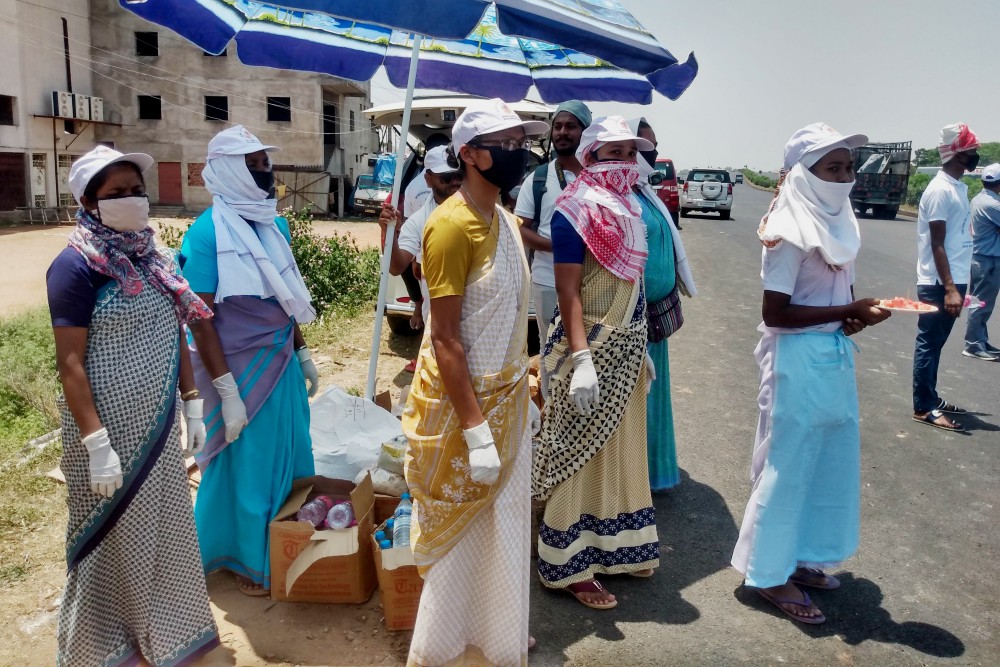
Loreto Srs., from left, Nirmala Toppo, Sawanti Lakra, Jiwanti Tete, Rajini Lugun and Gloria Lakra wait in scorching heat with food packets for migrant laborers on the move at a national highway stop. (Provided photo)
One such religious is Loreto Sr. Punitha Visuvasam in Doranda near Ranchi, capital of the eastern Indian state of Jharkhand and home to thousands of migrants.
As the workers started arriving on trucks and buses, the Loreto nuns on May 23 went to highways in Jharkhand with food packets. The nuns found many walking the long way home. "We helped them board buses to their villages," Visuvasam told GSR by phone.*
She said they found the workers hungry, thirsty and tired and huddled together like animals in the trucks. For weeks, her sisters fed 400 to 500 people in transit daily.
They also collaborated with other congregations, such as the Missionaries of Charity, and Catholic youth to distribute food under the direction of the Ranchi Archdiocese.
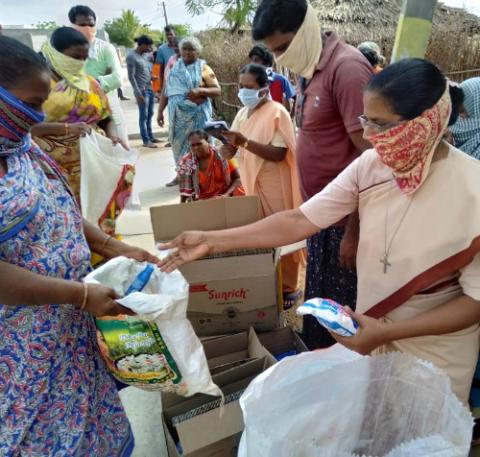
Sr. Tessy Paul Kalapparambath and her Missionary Sisters of the Immaculate team distribute food packets to migrants stranded in Hyderabad, capital of the southeastern state of Telangana. (Provided photo)
Another congregation in Ranchi, the Ursuline Sisters of Tildonk, reached out to the migrants from April 3. The nuns sheltered some of them in their school in Muri, some 40 miles east of Ranchi.
"We provided them all basic needs such as food, clothing and safety kits," Sr. Suchita Shalini Xalxo, the congregation's Ranchi provincial, told GSR June 17.
Xalxo said the migrants were in "pathetic conditions" when they arrived at their center. "Many had walked for two or three days without food. Some were beaten by police as they crossed from one state to another," Xalxo says.
Arranging transport for migrants was the main worry for people such as Sr. Tessy Paul Kalapparambath. Her Missionary Sisters of the Immaculate** in Hyderabad, capital of Telangana state in southeastern India, provided food and medicine to migrants on the move.
Their novitiate house, located near a highway, distributed cooked food and drinking water to some 2,000 migrants. Her team also distributed food packets at railway stations.
"It was heartbreaking to see thousands hungry and thirsty during this summer," Kalapparambath, secretary of the Labor Commission of the Telugu Catholic Bishops' Council, told GSR.
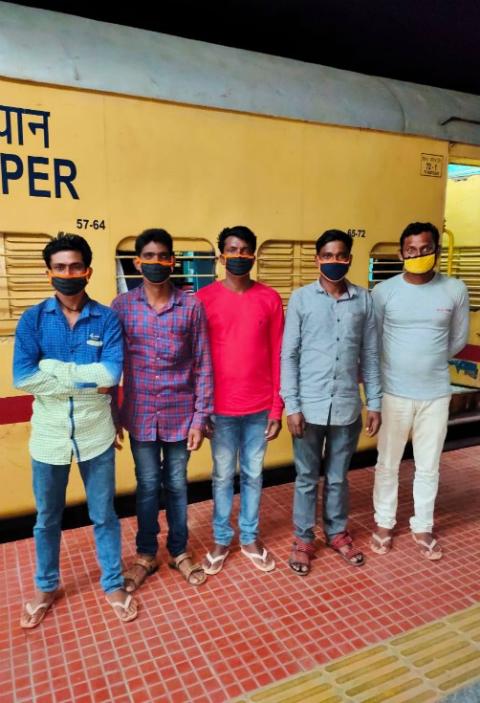
Migrants from Odisha, eastern India, who had been working in Kerala, southern India, arrive at the railway station in Bhubaneswar, the capital of Odisha state. (Provided photo)
In Hyderabad, Sr. Lissy Joseph of the Sisters of Maria Bombina went to bus and railway stations in early April as the media narrated the migrants' plight. She met workers from Assam, Jharkhand, Odisha, Uttar Pradesh and West Bengal — huddled in groups without food, money or shelter.
"It was a disturbing scene," Joseph told GSR.
A group told Joseph that their employer disappeared after driving them in a truck to Karimnagar in neighboring Telangana. They managed to find another truck to go to Hyderabad, more than 100 miles south. Joseph met them after the police asked them to return to wherever they had come from. "The first thing we did was to arrange food for them," Joseph said.
The nun then went to the police, who refused to help the workers, saying they did not belong to their jurisdiction.
Like Jena, Joseph used the social activists' network to seek help for the migrants. Joseph circulated the workers' photo on social media and a woman lawyer filed a case against the police and forwarded the picture to the district collector.
"Sharing the plights of these poor migrants in social media helps a lot. Things moved and the state labor office contacted me," Joseph explained. A junior officer took the workers to a temporary shelter and arranged two buses to take them to Odisha.
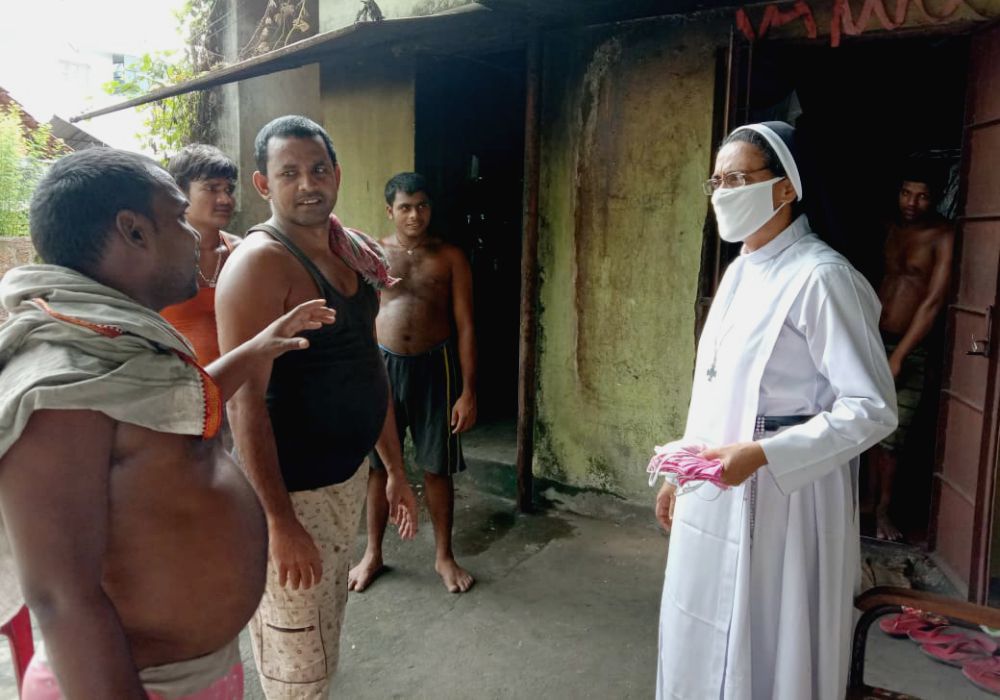
Congregation of Mother of Carmel Sr. Merin Chirackal Ayrookaran gives masks to migrant workers in the southwestern Indian state of Kerala. (Provided photo)
Some nuns in Kerala were prepared to deal with migrant workers' issues. The Congregation of Mother of Carmel had started in 2008 the CMC Migrant Workers Movement to help those fleeing anti-Christian violence in Odisha that year. It was later extended to help workers from other states.
Sr. Merin Chirackal Ayrookaran, who coordinates the movement, said they arranged medical camps, telecounseling and passes for stranded workers to go home.
In Delhi, Sacred Heart Sr. Celine George Kanattu is among those helping stranded migrants. She started helping the laborers after some domestic workers came to her for food. With the support from benefactors and her congregation, her team has provided food, clothing, masks and sanitizers to some 600 migrants.
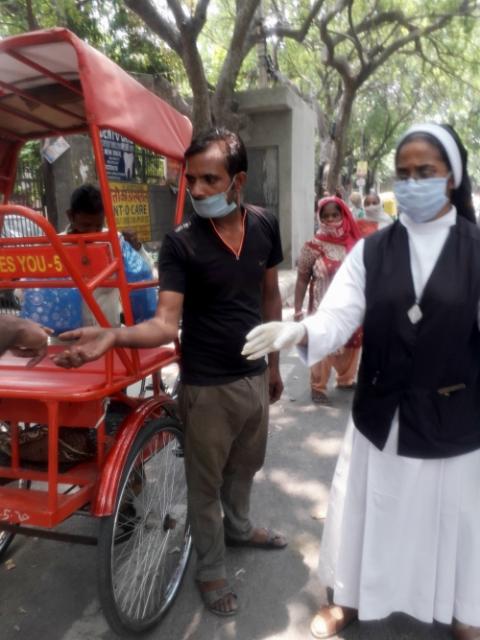
Sacred Heart Sr. Celine George Kanattu distributes clothes to migrant laborers stranded in Delhi because of the nationwide lockdown to contain the coronavirus pandemic. Jameel Ahmed, a tricycle taxi driver, is seen with his vehicle, given to him by Kanattu a few months ago. (Jessy Joseph)
One of Kanattu's beneficiaries is Jameel Ahmed, a Muslim who drives a tricycle taxi. The father of four says his family would have died of hunger if the Catholic nuns had not provided them with food kits.
Similar sentiments were told to Sister Anne Jesus Mary, director of a development center in Jashpur, a town of Chhattisgarh state in central India.
She said at times the migrants would snatch food packets from her hands and eat them immediately. "They would then say, 'Madam, we can now move on. We hope to find more people like you on our journey ahead,' " the Franciscan Missionaries of Mary nun told GSR.
Many workers have kept their links to the nuns after reaching home.
Jena has created a WhatsApp group with those she helped. "They use my number as the helpline. I get many calls. At times, I can go to bed only after 2:30 a.m. I ensure safe return of anyone who wants to go home."
She has also posted the crying girl's photo as her WhatsApp display picture. "I will keep it until the last of migrant laborers reach home," she asserts.
*This paragraph has been edited to remove an incorrect title.
**An earlier version of this story gave an incorrect community.
[Jessy Joseph is a freelance writer in New Delhi. This story is part of a collaboration between GSR and Matters India, a New Delhi-based news portal that focuses on social and religious news.]
